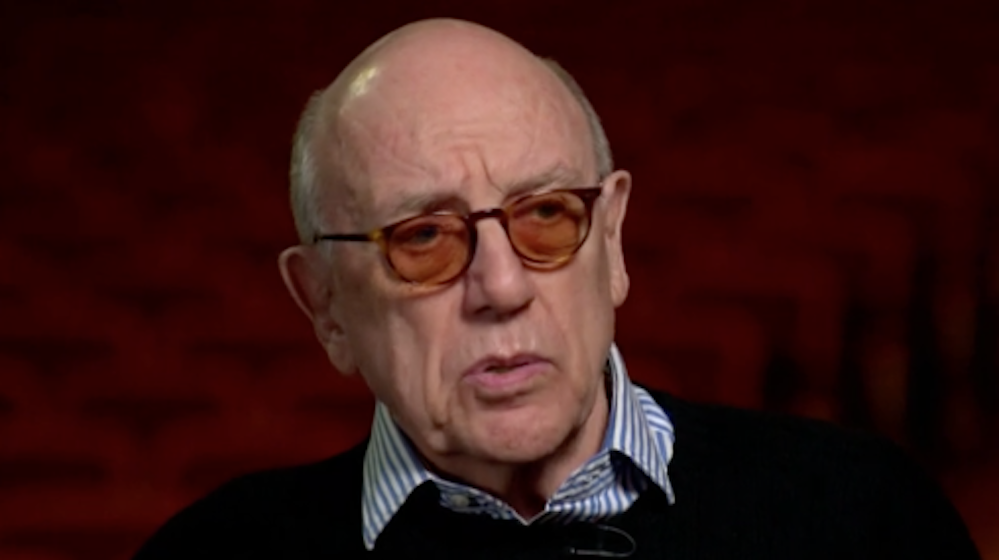Mart Crowley, who changed American theater with his trailblazing — and just plain blazing— gay-themed play The Boys in the Band (1968), died Sunday. He was 84.
Crowley's death was first reported by writer Michael Musto. He reportedly suffered a heart attack, had surgery, but passed away while recovering from surgery.
The writer had been enjoying a renaissance, with his signature work revived and given its first Broadway run in 2018, earning him a Tony. (Review here.) A filmed version of that production — starring Matt Bomer, Jim Parsons, Zachary Quinto, Andrew Rannells, Charlie Carver, Brian Hutchison, Michael Benjamin Washington, Robin de Jesús and Tuc Watkins — will stream on Netflix later this year.
Context: A History of LGBTQ People on TV HERE
“I was more than thrilled to know that they were optioning it for a Broadway premiere, at least. So it took 50 years. And it was on its 50th anniversary that the show opened,” the scribe said in 2019.
Born in Vicksburg, Mississippi, on August 21, 1935, Crowley studied acting at the Catholic University of America, gravitating to Hollywood, where he worked as a production assistant while attempting to break into show-biz as a writer.
Inside the Opening-Night Party for The Boys in the Band HERE
He met actress Natalie Wood (1938-1980) on the set of Splendor in the Grass (1961) and became, by all accounts, one of her closest friends. She also hired him to be her assistant, encouraging him as he embarked upon he writing of The Boys in the Band, the initial production of which she and husband Robert Wagner (b. 1930) helped fund.
Also instrumental to his success was the largesse of his friend Diana Lynn (1926-1971). The actress hired him to housesit in her palatial digs, allowing him not only free time but a taste of the high life he sensed he'd never have; envy, living beyond one's means, and anger at the injustice of the limitations in being gay in the '60s all helped fuel the play.
The Boys in the Band premiered off-Broadway on April 14, 1968. Focused on a group of gay friends killing time and, slowly, each other's egos while playing a nasty party game at a birthday bash, the play became a phenomenon, predating Stonewall (by this much) but prefiguring it in some ways, with its uncorked rage.
So successful was the production that it was immediately optioned for film and was shot by director William Friedkin (b. 1935) as a feature film, released on March 17, 1970. The film has the unusual distinction of using the entire original off-Broadway cast — mainly because name actors refused to play gay.
My Deep Dive Into the Movie HERE
Receiving generally positive reviews, it was nonetheless a hard sell to a general audience, featuring explicit references to gay sex and presenting gay men as heroes, albeit flawed heroes. There is pathos, but nobody commits suicide in the end, and for 1970, that was a big deal, kids. The Los Angeles Times would not even run the film's ads.
Still, because Stonewall had occurred and Gay Lib was on the march, the film has frequently been criticized as propagating — rather than artfully exploring — self-loathing. This take on the source material was revisited when the play hit Broadway in 2018, though seeing it as a period piece helped make it more palatable to young queer men who may want to believe they have nothing in common with a generation more comfortable in a closet, and about to be decimated by AIDS. (Several original cast members died of AIDS-related complications.)
Crowley went on to write other works, though nothing as personal nor as impactful as The Boys in the Band, including a 2002 sequel work entitled The Men from the Boys, Remote Asylum (1970) and A Breeze from the Gulf (1973).
He instead made his living as an executive script editor and producer of Wagner's hit TV series Hart to Hart from 1979-1983, and wrote two of that show's later TV movies (1995 & 1996).
Among other TV writing, Crowley contributed to the Bette Davis (1908-1989) TV pilot The Decorator (1965); wrote the telefilm There Must Be a Pony (1986), a vehicle for Wagner and a resurgent Elizabeth Taylor (1932-2011); adapted Dominick Dunne's (1925-2009) People Like Us (1990); and adapted Barbara Taylor Bradford's (b. 1933) Remember (1993).

An in-demand commentator on gay culture, he spoke at length aboutThe Boys in the Band in the must-see doc Making the Boys (2011).





